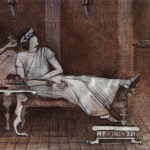
udra11 / shutterstock.com
“‘I didn’t say there was nothing better,’ the King replied. ‘I said there was nothing like it.’” —Lewis Carroll,
Through the Looking Glass
“Why did I get this? Was it because of my diet? What should I eat now? What diet should I follow? Are there any natural treatments I can take instead of medications?”
We are all familiar with these frequent questions asked by our newly diagnosed patients with rheumatic disease. For years our response was to deny a relationship between rheumatic diseases and food, diet and nutrition—or, perhaps more generously, to concede that we don’t know.
We offer our perspectives about certain aspects of this topic—one of us (i.e., Dr. Cerk) has systematically reviewed this topic during fellowship and the other of us (Dr. Panush) has studied, thought about and written on this over the years.1-6
History
The belief that diet can remedy many health conditions dates back to ancient times. Hippocrates is alleged to have said, “Let food be thy medicine and medicine be thy food.” Although this notion has become relevant for some disorders, such as diabetes, heart disease and celiac disease, a role of nutrition in rheumatic diseases remains elusive.
Finding a relationship between diet and rheumatic disease was of considerable interest in the early 20th century. However, those early attempts to study this issue largely failed to find a convincing or consistent association, and this came to be labeled quackery by the rheumatology community.5
An informational handout for patients from the Arthritis Foundation, The Truth About Diet and Arthritis, stated, “no food has anything to do with causing arthritis, and no food is effective in treating or ‘curing’ it.”5,7
Toward the end of the 20th century, quackery was replaced by complementary or alternative medicine or, even more euphemistically, as integrative medicine. With these changes came renewed attention on the relationship of diet, food and nutrition with rheumatic diseases. The topic is now generally perceived as a legitimate area of inquiry in mainstream rheumatology and has attracted credible and respected investigators.5
The widespread popularity of complementary and alternative medicine tells us, in part, that we need to be more “sensitive, responsive and empathetic to our patients and their needs” and is also a reminder that we need to do better at finding causes and cures for rheumatic diseases.3
Regardless of one’s own beliefs on this topic, it is important to keep an open mind and an open dialogue with our patients. Further, we must not dismiss ideas beyond our usual paradigms just because we may not understand them. Many scientific breakthroughs would not have occurred if we had not balanced healthy skepticism with a mind open to new ideas.4

